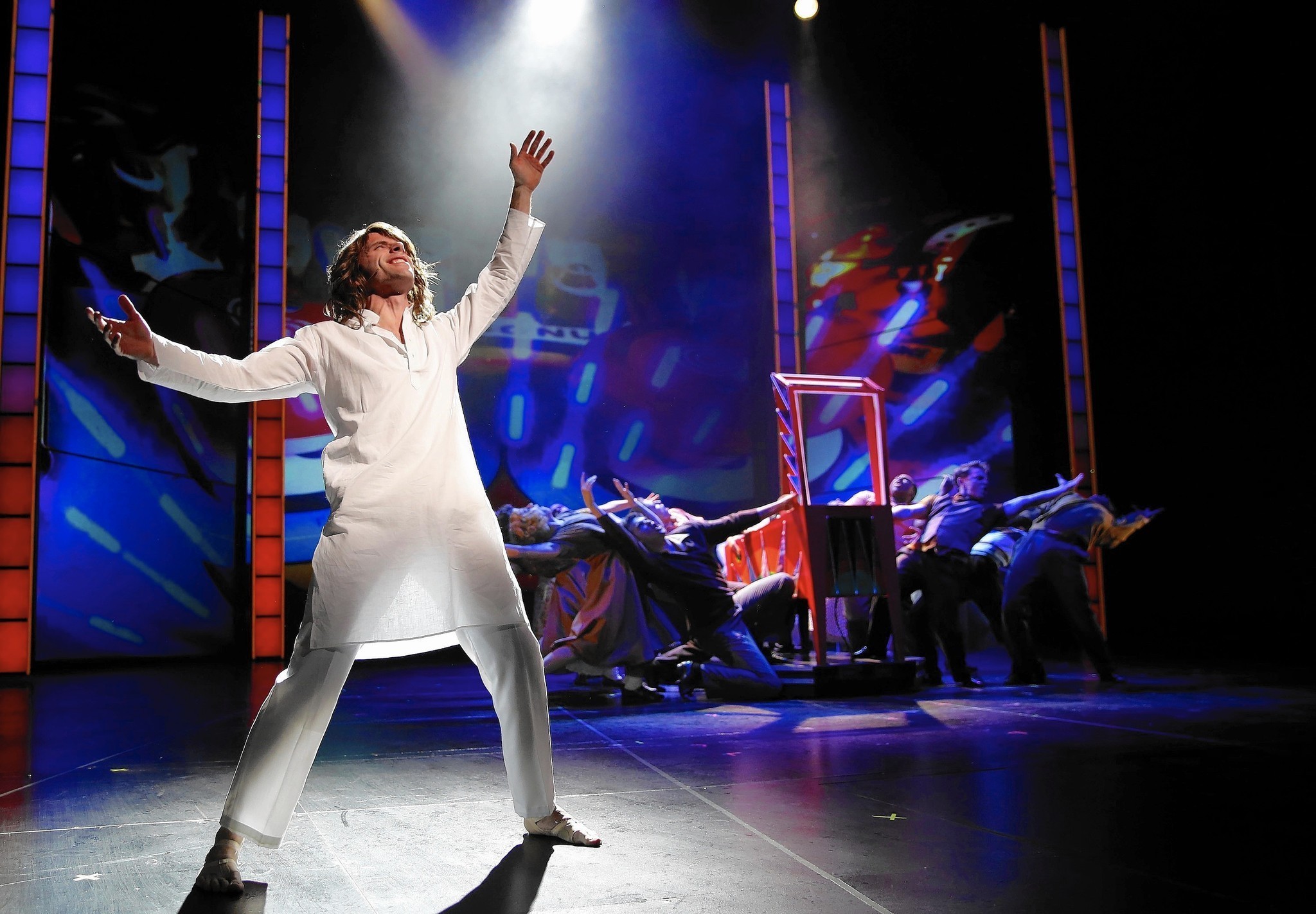

PARAMOUNT ROCKS INTO DARK WORLD OF ‘THE WHO’S TOMMY’
HEDY WEISS on January 18, 2015
That much-abused but visionary pinball wizard is back. And you can find him at the Paramount Theatre in Aurora, where director Jim Corti (in league with choreographer Brock Clawson) has pulled out all the stops and created a psychedelic-meets-high-tech sound, light and video show.
Without question, this is a spectacular, innovative production. But it also must be said that it serves as a vivid reminder of just how twisted and sick this rock opera — which grew out of the famed British band’s 1969 concept album, and features a score by Pete Townshend, book by Townshend and additional lyrics by John Entwistle and Keith Moon — happens to be.
To be sure, there are plenty of “dark musicals,” from”Carousel” to “Spring Awakening.” But “Tommy” easily beats them all. The show is a catalogue of war, domestic violence and, above all, child abuse (in the form of psychological terrorism by parents, sexual abuse by an uncle and drug-addicted prostitute, sadistic bullying by a cousin and many others, and horrific treatment by a slew of doctors, parishioners and more). And throughout my overwhelming impulse was to shout: Will somebody please remove Tommy from the custody of Capt. Walker and his wife?
The story told is grimmer than any Grimm’s fairy tale. It begins in 1940 and the start of World War II when, just before he heads off on a bombing mission with Britain’s Royal Air Force, Capt. Walker (David Schlumpf) marries a 16-year-old beauty (a realistically sexy turn by Hillary Marren), who nine months later gives birth to their son, Tommy (deftly played by Peyton Owen at age 4, the riveting Ricky Falbo at 10 and power-voiced Devin DeSantis as a young adult).
Although Mrs. Walker is notified that her husband has been killed, he has, in fact, been held for years in a prisoner of war camp. And when he returns home to find her with another man, he very quickly shoots the lover in full, traumatizing view of little Tommy. The Walkers immediately command the tot to breathe not a word of the murder, and the child just as quickly retreats into a world where he refuses to see, hear or speak.
Instead of facing up to their owned warped behavior, the Walkers proceed to take Tommy to a series of doctors, preachers and “healers,” and negligently leave him alone with his perverted Uncle Ernie (Jake Klinkhammer) and twisted Cousin Kevin (Liam Qualy). Capt. Walker even considers letting a Gypsy hooker (a salacious Meghan Murphy, in full belt mode) heal him.
Only when Tommy discovers his brilliant skills with the pinball machine, and becomes an unlikely sensation, do things begin to change, although it is not until his mother smashes the mirror he stares into that he becomes “free.” But even his celebrity has a dark side, and it’s not until he has a spiritual awakening (leading to a belief-challenging reconciliation with his parents and other tormentors) that he finds a sort of flower child era, Christ-meets-Krishna peace.
Corti certainly pulls no punches in exposing the pitch black aspects of the story (which, it should be emphasized, is definitely not recommended for kids). He has found an ideal collaborator in Clawson, a contemporary choreographer who breaks the musical theater mold — from a witty parachuting scene to his staging of a psychiatric exam scene that is a horrifying stunner. And the voices of the ensemble are formidable, with Eric A. Lewis, Jonny Stein and Jonathan Butler-Duplessis standouts.
Music director Tom Vendafreddo’s eight-piece band truly rocks. And Corti’s designers — Linda Buchanan (sets), Greg Hofmann (lights), Mike Tutaj (projections) and Adam Rosenthal (sound) — have created a constantly morphing backdrop, with Theresa Ham’s Op Art-style costumes supplying additional pop.
Yet for all its fervency and artfulness, “Tommy” leaves me strangely cold. This is a show where you have to wonder: After such cruelty, what forgiveness?
